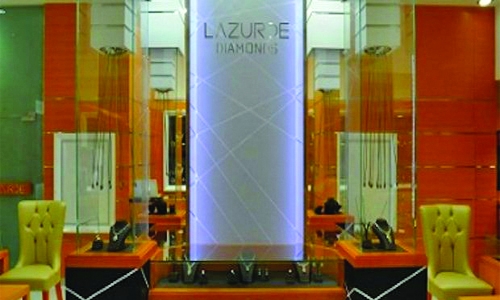Saudi’s L’azurde jewellery plans UAE, Qatar expansion
Riyadh : Saudi Arabia’s L’azurde Company for Jewellery, which surged on its trading debut in Riyadh on Wednesday, plans to almost double the number of its branches in the Middle East and North Africa by 2018.
Chief executive Selim Chidiac told Reuters that market conditions in Saudi Arabia were very challenging as consumers have been hit by the slide in oil prices, but expanding into new countries and increasing market share would help the jewellery maker to keep growing.
“The priority is primarily into the Gulf but there are opportunities for us to go to the wider Middle East and North Africa,” Chidiac said in an interview on Wednesday.
“In the Gulf, there are opportunities I would say primarily in Qatar, the United Arab Emirates and Kuwait,” he said, adding the company was looking to also expand in Egypt, Morocco and Algeria.
L’azurde was the first retail company to list in Riyadh in more than a year and closed at SAR 39.8 on Wednesday, up 7.6 per cent from its IPO price, after rising to its daily limit of 10 per cent at one point.
The company, which raised SAR 477.3m ($127m) from its initial public offering, makes gold and diamond jewellery in Saudi Arabia and Egypt and distributes to wholesale markets in 52 countries, mainly in the Middle East.
Chidiac said the company, which was set up in 1980 in a small workshop in Riyadh and has grown to be one of the leading jewellery companies in the kingdom, aimed to increase its total branch network to 30 shops in the next two years from 16 currently.
The company’s wholesale operations generate 80 per cent of revenues but Chidiac said it aims for its retail operations to contribute 30-35 per cent of annual revenue within three to five years.
It started selling diamond jewellery in 2013 to retail traders in Saudi Arabia and Egypt.
Prior to its IPO, the company was majority owned by a consortium led by Investcorp and generated revenue of SAR 2.81bn and a net profit of SAR 100.6m in 2015, up 4 and 16 per cent year on year respectively.
It is adjusting its product range to account for more cautious consumer spending habits, including using a lower weight of gold in some of its jewellery, Chidiac said.
“For example, a wedding set which used to weigh 70 grams, we now produce at 40 grams to offer consumers,” he said.
“I would say it is a market share game. Yes, the market is challenging, but we have been growing our market share in Saudi and in the region despite current conditions.
Chidiac remains optimistic about the jewellery sector, saying consumers in the Middle East still want gold for special occasions and as a safe-haven investment during times of economic volatility.
Related Posts

